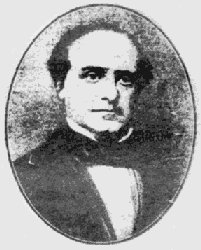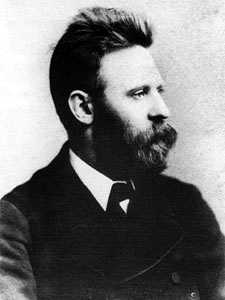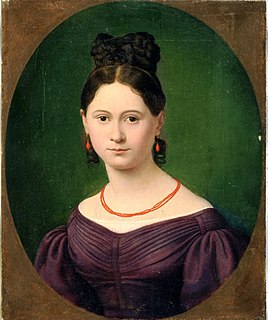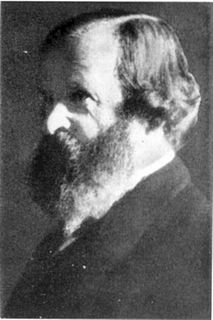
Ernest Charles Jones was an English poet, novelist and Chartist.

Johann Joseph "Hans" Most was a German-American Social Democratic and then anarchist politician, newspaper editor, and orator. He is credited with popularizing the concept of "propaganda of the deed". His grandson was Boston Celtics radio play-by-play man Johnny Most.

Johanna Bertha Julie Jenny Edle von Westphalen was a German theatre critic and political activist. She was married to the philosopher and political theorist Karl Marx.

Louis Kugelmann, or Ludwig Kugelmann, was a German gynecologist, social democratic thinker and activist, and confidant of Marx and Engels.

Jenny Laura Marx, better known as Laura Marx, was the second daughter of Karl Marx and Jenny von Westphalen. In 1868, she married Paul Lafargue. The two committed suicide together in 1911.
Heinrich Marx was a lawyer and the father of the revolutionary leader and influential socialist thinker Karl Marx.

Eugen Oswald, was a journalist, translator, teacher and philologist who participated in the German revolutions of 1848–49.

Friedrich Wilhelm German Mäurer (1811-1883) was a German Communist writer and leader of the early German labor movement. He joined the League of Outlaws because of his democratic beliefs. When the League of Outlaws became the League of the Just, Mäurer became a member of the League of the Just. He wrote poetry for its newsletters and several books, and with Moses Hess was an important link between it and Karl Marx.
Die rote Fahne des Ostens was a newspaper published from Königsberg. It was the organ of the East Prussia-Danzig organization (bezirk) of the Communist Party of Germany. It functioned as the local edition of the Berlin-based newspaper Die Rote Fahne between 1919 and September 1922. During this period Martin Hoffmann served as editor of the newspaper. Erich Wollenberg became the editor-in-chief of Die rote Fahne des Ostens in 1922. In 1922 Die rote Fahne des Ostens was replaced by Echo des Ostens.
"Withering away of the state" is a Marxist concept coined by Friedrich Engels referring to the idea that, with realization of socialism, the social institution of a state will eventually become obsolete and disappear as the society will be able to govern itself without the state and its coercive enforcement of the law.
Waltraud Falk was born in Berlin as Waltraud Tessen and became an economist.

The German Ideology is a set of manuscripts written by Karl Marx and Friedrich Engels around April or early May 1846. Marx and Engels did not find a publisher, but the work was later retrieved and published for the first time in 1932 by David Riazanov through the Marx-Engels Institute in Moscow. The first part of the book is an exposition of Marx's "materialist conception of history", though recent research for the new Marx Engels Gesamtausgabe (MEGA) indicates that much of the 'system' in it was created afterwards by the Marx-Engels Institute in Moscow in the 1930s. Much of the rest of the book consists of many satirical polemics against Bruno Bauer, other Young Hegelians, and Max Stirner's The Ego and Its Own (1844).

Die Marx-Engels-Gesamtausgabe (MEGA) is the largest collection of the writing of Karl Marx and Friedrich Engels in any language. It is an ongoing project intended to produce a critical edition of the complete works of Marx and Engels that reproduces the extant writings of both authors in books of high-quality paper and library binding.

The Baumwollspinnerei Ermen & Engels is a former cotton mill in Engelskirchen, Nordrhein-Westfalen, Germany. It is now part of the LVR Industrial Museum.
Bruno Kaiser was a Marxist scholar of German studies who became a journalist and, during the Nazi period, a resistance activist. In his later years he became, in addition, a distinguished librarian.
Horst Bartel was a German historian and university professor. He was involved in most of the core historiography projects undertaken in the German Democratic Republic (1949–1989). His work on the nineteenth-century German Labour movement places him firmly in the mainstream tradition of Marxist–Leninist historical interpretation.

Sonja Kehler was a German actress and chanson singer, known internationally for her interpretation of works by Bertolt Brecht, first playing his characters on the theatre stage, then focused on singing his songs and those of others in solo programs. She also taught acting in Danish at the theatre academy in Odense, appeared in films, worked as stage director and presented literary programs.
Wolfgang Schröder was a German historian. The early decades of his professional career were spent as a member of the East German historical establishment: the focus of much of his work was on the history of the labour movement. He nevertheless remained professionally active and made further important contributions through his published work and teaching during the years after reunification.
Sieghard Brandenburg was a German musicologist, who stood out especially as a Beethoven researcher.
Anarchism in Denmark emerged in the late 19th century from the revolutionary factions of early social democratic spheres, crystalizing into a widespread anarcho-syndicalist movement that reached its height during the late 1910s. After the disintegration of organized syndicalism, anarchists in post-war Denmark began to organize the squatters' movement, which led to the creation of Freetown Christiania.










